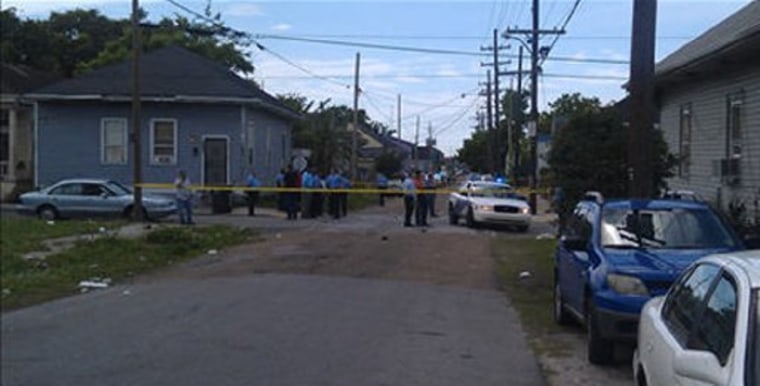The Mother’s Day parade shooting in New Orleans Sunday demonstrates the role handguns play in urban violence. Police say up to three suspects using two types of firearms were involved. Bystander videos taken from different angles of the parade scene show two different suspects, each firing a handgun in the street. At least 19 people were injured including a boy and a girl, each 10 years old.
The gun lobby recently helped defeat bills in the Senate designed to help curb the flow of handguns to criminals. One sponsored by Democratic Rep. Joe Manchin of West Virginia and Republican Rep. Patrick Toomey of Pennsylvania would have mandated background checks for more gun purchases. Another sponsored by Democratic Sen. Patrick Leahy from Vermont would have restricted the reselling of firearms or “straw purchases.”
“We don’t know yet what this case illustrates,” Josh Sugarmann, executive director of the nonprofit Violence Policy Center, told msnbc.com. “It could have been a case involving law-abiding gun owners.” Louisiana has some of the laxest gun laws in the nation, including allowing citizens to carry concealed weapons, he added.
The National Rifle Association maintains that an armed citizenry can be a deterrent to criminal violence. But that's not what happened in this case. Instead, families and others enjoying the Mother’s Day parade are seen in videos diving for cover as gunmen fire at their apparent rivals among the packed crowd.
About 40% of all gun purchases involve private citizens where the buyer is not now subject to a background check, according to an analysis by Politifact citing experts on both sides of the nation’s gun debate. The 1994 Brady Act, named for President Reagan’s former press secretary James Brady who was wounded in an assassination attempt, requires only gun sellers who are licensed firearms dealers to run a background check on a potential buyer.
"What occurred in New Orleans is a horrible tragedy, and unfortunately one that plays out on our city streets every day across America," said a Brady Campaign spokesperson. "Handguns are used to take the lives of thousands of people each year. So many shootings like this one can be prevented by not allowing dangerous criminals access to guns. We can do that through expanding background checks because right now a criminal can purchase a gun over the internet, or at a gun show, with no questions asked. If we don't stop this flow of guns onto our city streets, people will continue to mourn the loss of innocent victims of gun violence."
Handguns are used in nearly three out of four gun-related homicides in the United States, according to FBI records. Every day about 17 individuals are murdered with a handgun across the nation, although homicides, like the nation’s overall crime rate, have been declining in recent years.
But the violence continues, especially in urban areas. Over half of all homicides in the United States have occurred in cities like New Orleans with a population over 100,000, according to a 2011 U.S. Justice Department study. More than a third of all homicides in large cities occurred in the biggest cities like New York, Los Angeles and Chicago with populations well over one million.
Handguns are used in most of the murders. How do they end up in the hands of so many criminals?
Just 1% of licensed firearms dealers were responsible for reselling nearly 60% of all guns traced to a crime, according to one study by Johns Hopkins Bloomberg School of Public Health researchers. New York City Mayor Michael Bloomberg, a gun control advocate, has given over $1 billion to his alma mater John Hopkins University including $289 million to the public health school that since 2001 has born his name.
In the city of Los Angeles, one of every five guns that was used in a crime was resold in one or more “straw purchases” leading it to a criminal, according to a prior U.S. Treasury Department report. This past December in Illinois a suburban man was charged with supplying dozens of guns that he bought in Indiana to resell to an alleged gun trafficker based in the crime-ridden South Side of Chicago.
Many guns are also legally purchased. Louisiana is a state with a high rate of gun ownership and relatively weak gun laws, and it had gun deaths at a rate well above the national average of 10.25 per 100,000 people in 2010, according to an analysis this year by the Violence Policy Center. Alaska, Montana, Alabama and Wyoming each have a similar combination of lax gun laws and high gun ownership rates, and each of those states also had per capita gun deaths of one and a half to two times the national average.
Northeastern states like Massachusetts, Rhode Island, New Jersey and New York, along with Hawaii, by contrast, have both strong gun laws and low rates of gun ownership, and each of these states experienced far fewer firearms-related deaths on average than the rest of the nation.
“The more lax the laws, the more violence you have,” Sugarmann told msnbc.com.
